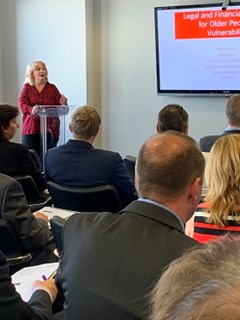Thu 4 Jul. 2019
Later Life Financial Planning

Whilst vulnerable adults describe people over the age of 18, Tish concentrated on the older clients of professionals such as financial advisers, lawyer, and accountant or investment managers as there are over 1.5 million people aged 85 and over in the UK, with a high proportion living in the Southwest.
Tish also explained that not all elderly people suffer with dementia but how the healthy brain suffers from deterioration in cognitive function and hence shared practical tips for meeting older clients summarised as:
• Ask if your client can hear you clearly and ask them to stop you if they do not understand
• Speak at a pace and tone that is comfortable for your client
• Remember that what may be obvious to you is not necessarily obvious to the client
• Keep communicating in the way that suits the client best and contact them regularly
• Consider how best to communicate in writing
• Consider whether the client might benefit from the written information in a larger font
• Be accessible to your client
• Be able to give consideration to how to embed these principles into their advice process
• Have an understanding of capacity issues and how they apply to advising older clients
• Understand key principles of the role of decision making by a third party and its limitations
• Ask client for preferences - family member or trusted friend present at the meeting. [ see them alone too]
• Do not over-complicate the advice. Bit sized chunks
• Explain the client’s options and allow them to make their own decisions based on the information.
• Explain why you need to know a substantial amount of personal information and what you will do with it
• Respect their privacy, but explain the consequences of you not knowing their full relevant situation
• Encourage questions and continue to check understanding [particularly if doubts about capacity]
• Recognise the vulnerability that arises because of the knowledge gap between the client and adviser
• People often take financial advice at times of difficulty or stress [ Care Planning and funding is a good example]
• Awareness of Potential for physical/ mental/ financial abuse
Tish then finished the presentation reiterating the overriding message was keeping detailed records is vital.
